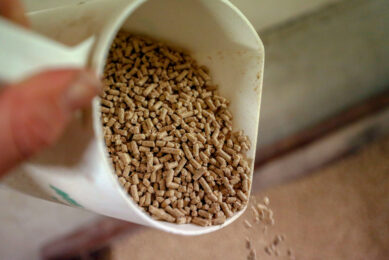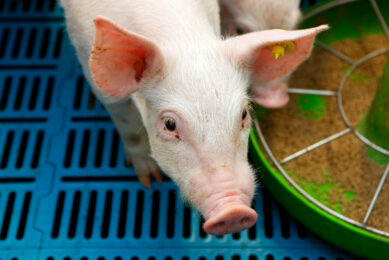Latest research in probiotics
Probiotics have great potential to beneficially affect the gut microflora and hence improve gut health. Recent data confirms that a single strain or a combination of several bacterial strains in a ‘multi-strain’ preparation is highly efficient in animal feeding.
By Dick Ziggers
Scientists are aiming to establish the delicate symbiotic relationship between animals and their bacteria. Here, research focuses on the digestive tract where bacteria are very important to the well-being of the animal. Since probiotics do not result in the development and spread of microbial resistance, they offer huge potential to become an alternative to antibiotics. Probiotics could be successfully used as nutritional tools in animal feeds for promotion of growth, modulation of intestinal microflora, and pathogen inhibition and immunomodulation.
Researchers at the Nippon Veterinary and Life Science University in Tokyo, Japan, concluded that probiotics may modulate the intestinal immune response through the stimulation of certain cytokine and IgA secretion in intestinal mucosa. The health-beneficial effects of probiotics, in particular the immunomodulation effect, depend on the strain used. Differences in indigenous intestinal microflora significantly alter the magnitude of the effects of a probiotic. Therefore, specific probiotic strains suitable for each animal species and their life stage as well as each individual should be determined.
Probiotics in cattle
In France, scientists at the research institute INRA analysed 110 papers, 157 experiments and 376 treatments dealing with yeast supplementation in ruminants. The objective was to highlight the major quantitative effects of live yeast supplementation on intake, rumen fermentation, and milk production. They concluded that, although rumen fermentation efficiency per se was not measured, the results suggest an improvement in rumen fermentation by yeast supplementation. This effect could, however, be modulated by several different factors such as dry matter intake, percentage of concentrate, or neutral detergent fibre in the diet or species.
At the University of California-Davis, scientists aimed to determine the effects of feeding a culture of Saccharomyces cerevisiae on the performance, health, and immunocompetence of calves in the first 70 days of life. Feeding yeast culture in grain improved health, minimised frequency of health treatments, and reduced risk of morbidity and mortality in dairy calves. Income at the end of the study was improved by $48 per calf fed with yeast culture.
In a field trial at the University of Wisconsin, the effect of direct-fed microbial supplementation (Enterococcus faecium plus Saccharomyces cerevisiae yeast) on health and performance of pre- and post-partum dairy cattle was studied. Supplementation with the direct-fed microbial (DFM) product increased milk fat percentage for the first lactation cows and increased milk protein percentage for the second and greater lactation cows during the first 85 days in milk (DIM). Second-lactation cows fed the DFM product received fewer antibiotic treatments before 85 DIM than cows receiving the placebo. This validated the dairy producer’s concern that cows consuming one of the diets (revealed to be the placebo diet after the study was completed) were experiencing more health problems. However, differences in milk yield were not significant.
Feeding DFM to dairy cows does not always bring results. At the University of Minnesota, US, it was found that supplementing mid-lactation cows with DFM products containing Lactobacillus acidophilus and Propionibacteria freudenreichii did not affect cow performance, diet digestibility, or rumen fermentation.
Probiotics in pigs
The use of prebiotics and probiotics is being widely used in pig diets, as these additives have demonstrated a high efficacy in preventing gut disorders and improving gut health, particularly in the period immediately post-weaning.
In Germany (2008) the influence of oral treatment of pigs with the probiotic bacterium Enterococcus faecium NCIMB 10415 on Salmonella enterica serovar Typhimurium DT104 infections in weaning piglets was studied. The results of this study suggest that E. faecium NCIMB 10415 treatment enhanced the course of infection in weaning piglets challenged with S. Typhimurium DT104. However, the probiotic treatment also appeared to result in greater production of specific antibodies against S. Typhimurium DT104. Trials at the University of Copenhagen in Denmark (2008) suggest that probiotic administration immediately after birth promotes the colonisation of a beneficial commensal microbiota capable of limiting the formula-induced mucosal atrophy, dysfunction, and pathogen load in preterm neonates, thereby reducing the incidence and severity of necrotising enterocolitis.
Agtech Products of Waukesha in Wisconsin, US (2008) studied the effect of a DFM-based on a combination of Bacillus organisms specifically selected to increase the manure decomposition process and its efficacy for improving growth performance and manure dissolution time. Gain:feed improved in pigs fed Bacillus compared with the control diet during the finisher phase and throughout the combined growing-finishing period. The time required to dissolve the manure was reduced in samples collected from pens containing pigs fed Bacillus compared with samples from control pens.
An additional evaluation was conducted in a commercial swine production facility using statistical process control analysis. The analysis determined that supplementation with Bacillus increased the expected mean for ADG and decreased the expected mean for mortality. Supplementation with a DFM composed of specifically selected Bacillus organisms improved gain:feed, and decreased the time required to disperse a swine manure sample in a controlled study conducted at swine research facilities. Furthermore, when evaluated in a commercial swine production facility, the Bacillus-based DFM improved ADG and reduced mortality of pigs during the growing-finishing period.
Probiotics in poultry
Probiotics stimulate the production of natural antibodies in chickens, a study at the University of Guelph, Canada, showed (2006). Findings demonstrated that immunised day-old chicks that were treated with probiotics had increased levels of serum and intestinal antibodies. However, elucidating the role of these antibodies in maintenance of the chicken immune system homeostasis and immune response to pathogens would require further investigation.
Iranian trials at the Tarbiat Modares University (2010) assessed the effect of administering probiotics in water or as a feed supplement on broiler performance and immune response. The method of administration can influence the performance and immune competence of birds, and administration via drinking water appears to be superior to the more conventional in-feed supplementation method.
In Italy at the University of Bologna, probiotics were trialled on their effectiveness against Campylobacter jejuni. In this study, 55 lactic acid bacteria and bifidobacteria were screened. On the basis of the outcome, two strains, namely Lactobacillus plantarum PCS 20 and Bifidobacterium longum PCB 133, were chosen for an in vivo trial in poultry. B. longum PCB 133 appeared to possess interesting probiotic properties and a marked anti-Campylobacter activity both in vitro and in vivo. It would be an excellent candidate for being employed as a poultry feed additive for the reduction of foodborne campylobacteriosis in humans.
Greek work at the Agricultural University of Athens (2010) studied the effects of probiotic inclusion levels on broiler nutrition. It was concluded that probiotic inclusion level had a significant effect on broiler growth responses, nutrient apparent digestibility coefficient, AME(n), and caecal microflora composition.
Probiotics in fish
Chemotherapeutic agents have been banned for disease management in aquaculture systems due to the emergence of antibiotic resistance gene and enduring residual effects in the environment. Instead, microbial interventions in sustainable aquaculture have been proposed, and among them the most popular and practical approach is the use of probiotics.
A range of microorganisms have been used so far as probiotics, which include Gram-negative and Gram-positive bacteria, yeast, bacteriophages, and unicellular algae. The results are satisfactory and promising; however, to combat the latest infectious diseases, the search for a new strain for probiotics is essential.
Marine actinobacteria were designated as the chemical factory a long time ago, and to date quite a large number of chemical substances have been isolated. The potent actinobacterial genera are Streptomyces, Micromonospora, and a novel, recently described genus, Salinispora. Despite the existence of all the significant features of a good probiotic, actinobacteria have hardly been used as probiotics in aquaculture. However, this group of bacteria promises to supply the most potential probiotic strains in the future, researchers at the University of Tasmania, Australia, concluded (2008).
Probiotics in horses
Increasing starch in the equine diet can enhance nutrient digestibility. A study at the University of Maryland, US (2008) was conducted to determine whether DFMs could be used to increase digestibility and minimise the risk of acidosis associated with feeding an increase in the amount of starch fed to horses.
It was found that supplementing equine diets with either a single or mixed strain of direct-fed lactic acid bacteria had limited effects on nutrient digestibility or on reducing the risk of acidosis associated with feeding high-starch concentrates to horses.
At INRA in France the effect of live yeast culture supplementation (Saccharomyces cerevisiae strain) on apparent digestibility and rate of passage in (fistulated) horses fed a high- fibre or high-starch diet was studied. The absence of any significant diet-yeast interaction supports the strategy of using the yeast to stimulate cellulose digestion and improve the nutritional status of horses under both high-fibre and high-starch diets.
Probiotics in dogs
Researchers at the University of Wamia and Mazury in Olsztyn, Poland (2009) stated that Lactobacillus and Enterococcus are capable of colonising the alimentary tract in dogs. As a result, probiotic bacteria take an important part in the treatment of chronic inflammatory bowel disease.
Studies at the University of Ireland confirmed that Bifidobacterium animalis AHC7 has significant potential for improving canine gastrointestinal health.











